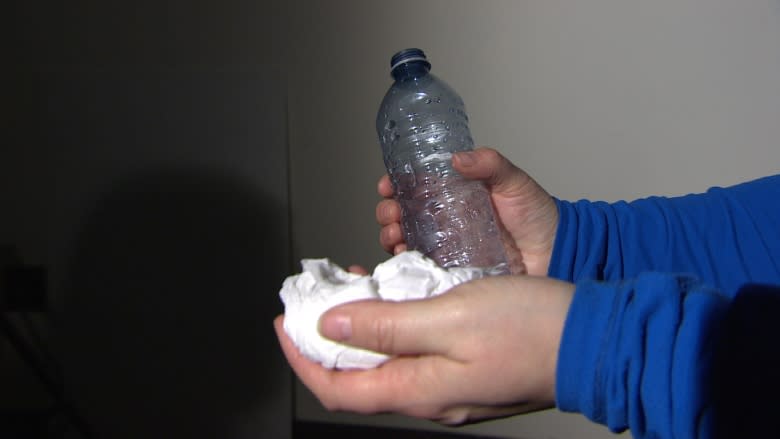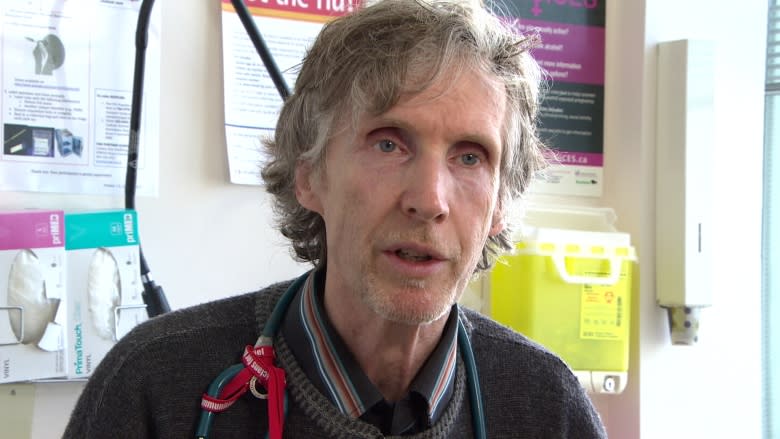Main Street sniffing 'out of control' says Winnipeg worker
Predatory solvent pushers are destroying the lives of some of the city's most at-risk people and no one is doing anything to stop it, says a woman who works on Winnipeg's Main Street downtown.
"They're slowly killing these people," she said in an interview, referring to those who sell solvents to make a bit of cash off vulnerable, addicted people.
"They need to do something about them because it is out of control," she said.
Near the corner of Main and Higgins, people can be seen carrying around half-empty plastic water bottles. What isn't apparent is that the bottles often contain solvents, not water.
Sellers are seen peddling the bottles with a small amount of solvent in the bottom for $5, but if the customer doesn't have that much money, they can get a rag doused in solvent for a buck or two. Users call it a cheap high, cheaper than alcohol or other drugs.
A buyer named Shirley, 32, said she's been using solvents for more than a decade. She said one pour on a rag can keep her high for about an hour.
"It gets my mood down," Shirley said, when asked why she sniffs. "It makes me calm."
Another user named Ronald, from Vancouver, is in a wheelchair.
"I just like to get stoned and happy," he said.
Selling solvents for sniffing not criminal offence
When the CBC I-Team talked to other users in the area, they were from places like Sandy Bay, Berens River, and northwest Ontario. Some are homeless and stay at the Main Street Project outreach centre, while others have a place to stay elsewhere on Main Street.
Several provincial laws make it illegal for anyone to sell solvents for the purpose of sniffing but it's not a Criminal Code offence.
One user on Main Street was observed taking a solvent rag out of his mouth and throwing it on the ground. A little while later another man came along, picked up the rag and put it in his mouth.
More than 1,400 commercial products have been identified as having potential for inhalant abuse, according to a 2011 Winnipeg report by the Non-Potable Alcohol and Inhalant Abuse Committee (NPAIAC).
The top abused products included gasoline, paint and cleaning fluids, paint thinner, plastic wood, glue, lighter fluid and nail polish remover, the report said.
The Addictions Foundation of Manitoba refused to talk to CBC News for this story, but the 2011 NPAIAC report said among AFM clients, 8.4 per cent of youths and 4.7 per cent of adults reported using solvents at one time in their life.
The report said health effects include damage to the brain, kidney, liver and lungs, as well as short-term memory loss, hearing and sight loss, dementia and limb spasms. It noted sudden death can also occur, often at the first use of an inhalant.
Sniffing the 'poor cousin' of substance abuse
Dr. Mike Dillon has treated hundreds of solvent abusers in northwest Ontario and Manitoba during decades in medicine.
From his office at Klinic in Winnipeg, he said treatment programs for sniffing are not as established as they are for other addictions.
"Solvent abuse is the poor cousin of many of the other substances that are used, partly because there are stigma associated with the use [of solvents]," said Dillon.
He said tackling the problem means addressing the issues behind it, such as poverty, racism, housing and sexual abuse.
Sellers 'just want the money'
The woman working at the Main Street business, who asked that her identity be protected for her safety, had harsh words for the sellers.
"Sometimes you just want to stick the cloth in their face and say 'Look at what you're actually doing to somebody,' but they have no feelings. They're very cold. They just want the money," she said.
"In their eyes they're doing nothing wrong because [the users] want the stuff. But to me, you're just a drug dealer. You're low. You're preying on these people."
"I constantly wait and wonder, when are they even going to die," she said.
"They've deteriorated that bad to the point where it could be any day that they're just not going to wake up."
She's particularly upset when she sees the sniffers are teenagers who should be in school.
"They're down there looking for their parents, and their parents are sniffers so they sniff right along with them. So it is getting worse. It is getting a lot worse."
Manitoba Health and Healthy Living funds treatment programs for solvent abuse but a spokesperson couldn't provide numbers on how many people are currently addicted.
"Although we are noting an increase, we are lacking sufficient information to say we are seeing a trend in solvent abuse," the province said in a statement.
Programing available 'pathetic'
Sunshine House is a not-for-profit agency on Logan Avenue that runs programs targeting solvent abuse.
Special projects manager Margaret Ormond says there aren't enough resources for solvent users in the city.
Ormond used the word 'pathetic' to describe what her program is able to offer versus what she'd like to offer.
She said program money dries up when each short-term program comes to an end.
Other addictions agencies echo those sentiments, saying there are few resources in place in the province specifically for solvent treatment.
Under the Safer Communities and Neighbourhoods Act, the government can take action to end the use of the property as a sniff house where solvents are sold.
Manitoba Justice said that in the last five years, it has shut down or given warnings to 18 property owners under the Act.
If you have a tip for the CBC News I-Team, please call our confidential tip line at (204) 788-3744 or email iteam@cbc.ca. You can also send a message on Twitter to @cbciteam.




